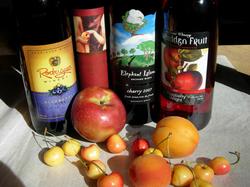
A great article by Melissa Priestley – enjoy!
Let’s face it: Canada is a pretty harsh place for grapes. Given the viticultural challenges, it’s no wonder our winemaking industry is still in its youth. Yet while the grape is a relative newcomer to Canada, many types of locally-grown fruit have been made into wine for centuries; fruit wines are quite common in countries where the climate is inhospitable for most grape varieties.
Fruit wine production comes with its own set of unique challenges. Grapes are somewhat of a miracle fruit (even though they don’t really work with the rest of the rhyme); sufficient amounts of sugar, acid, tannin, and water occur naturally in the berries so they can be easily made into wine. In contrast, most other types of fruit don’t have enough sugar to ferment properly, so it must be added, either in the form of table sugar or a more natural source like honey or even tree sap. Alternatively, the wine may be made from a blend of different fruits, including ones with higher sugar levels like raisins or dates. In addition, acid levels are often much higher than your average grape, so the crushed fruit is often diluted to reduce tartness.
Fruit wines, even red ones, should be served chilled just like white grape wines. They will also last for about the same amount of time once opened—two to four days, if you keep them refrigerated, and about a week if you use a preservative spray or a vacuum pump.
An important thing to keep in mind is that fruit wines do not improve with age. On the contrary, they deteriorate rather rapidly and lose their primary fruit flavours, often gaining unpleasant, weedy, and rank aromas. They should be consumed well within a year of being made.
HomeGrown Goodness
Though it was only recently that Albertans were allowed to operate cottage wineries (2005 to be exact), there are already a couple fruit wineries in our province. En Santé, located near Two Hills, was founded by Victor and Elizabeth Chrapko, former pig farmers who diversified into fruit production in the late 1990s. Their orchards, which were the first certified organic orchards in Alberta, grow 21 different varieties of fruits. Since 1997 they have perfected dozens of fruit wine recipes—look for wines made from Saskatoon berries, apples, and even alfalfa!
Alberta’s other fruit winery is Fieldstone Fruit Wines, located near Strathmore, which opened just before en Santé in 2005. This winery focuses on making fruit wines from berries. The wines were developed by Dominic Rivard, who has worked extensively in the fruit wine industry—he helped establish fruit wineries in China, Bangkok, and numerous Canadian provinces and was also a consultant to the government and Albertan fruit growers at the outset of our fledgling fruit wine industry. Fieldstone’s berry wines are made with as much care and qualification as any good French wine. Check out their brand new Strawberry-Rhubarb blend.
Across the Rockies
As you might expect, B.C. has several fruit wines made from the numerous orchards blanketing the Okanagan’s hills. One of the most renowned is Elephant Island, located in the Naramata Bench. The winery was founded in 1999 by Miranda and Del Halladay in partnership with Miranda’s grandmother Catherine Wisnicki. The winemaker, Christine Leroux, trained at the prestigious L’Institut d’Oenologie de Bordeaux in France. Like Rivard, she has applied the rigorous vineyard practices and intricate technical skills used to make fine grape wines, and the results are delicious, world-class fruit wines. The winery makes dinner, dessert, and even sparkling wines, crafted from such fruits as apricots, pears, and blackcurrants.
Forbidden Fruit Winery is located in B.C.’s Similkameen Valley. It specializes in making 100 per cent certified organic wines from 60 different varieties of tree fruit. The winery’s name has a double meaning; it derives from the creation story of Adam and Eve in the Garden of Eden, and it also reflects the past status of both organic produce and fruit wines, which were thought to be “forbidden” commercial territory explored only by hobbyists. This is not the case anymore, but it certainly makes for some saucy labels. Their wines are made under contract by Dominic Rivard (I told you he was everywhere). Though they do make a few dry table wines, it is with their fortified dessert wines that they truly shine. I especially love their Pomme Desirée, which is made from six varieties of apples and is mind-blowingly delicious—like liquid apple pie.
Down East
Even the East Coasters have gotten into fruit winemaking—the Rodrigues Winery in Newfoundland has made fruit wine since the early ’90s. These wines are also certified kosher—the only Canadian wines with this designation. Rodrigues primarily produces wines made from berries in both dry and sweet styles; I’m particularly fond of their Wild Blueberry. They also have a distillery that makes several fruit-based brandies and liqueurs. L’chaim!
